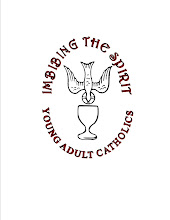Hi All,
I just wanted to include a few follow-up comments for folks who may have a few more questions.
In our discussion about the Holy Spirit, the question that many seemed most interested in was "What instances or when do I pray to the Holy Spirit?" It may help to think of the Nicene Creed in order to understand when it is appropriate to pray to the Holy Spirit:
We believe in the Holy Spirit, the Lord, the giver of life, who proceeds from the Father and the Son. With the Father and the Son he is worshipped and glorified. He has spoken through the Prophets.
Let's take a look at "the Lord, the giver of life." Without the Holy Spirit there would be no life. The Holy Spirit must be present
to, but not present
in everything (this idea should make more sense by contrasting the Holy Spirit in the Old Testament versus the New Testament).
Someone mentioned Gen. 1:2 - "the earth was a formless wasteland, and darkness covered the abyss, while a mighty wind swept over the waters" [sometimes translated as "a wind from God" or "God's Spirit"]. Once that mighty wind sweeps over the waters life began creating, that life force, or Who gives life, is the Holy Spirit.
The Psalms also reaffirm the importance of the Holy Spirit: "When you [God] send forth your spirit, they are created; and you renew the face of the earth" (
Ps 104:30). Life continues because the Holy Spirit is here to support.
By saying "proceeding from the Father and Son" we are witnessing to a dynamic relationship between Father, Son and Spirit. A relationship that many have tried to discuss in the past 2000 years of Christianity, but one that we will never fully understand until we meet God face to face.
Because the Holy Spirit proceeds from the Father and Son the Holy Spirit must also be divine and He must have some role to play in the life of every living thing. For instance, how did Christ become man?--"The angel said to her [Mary], 'The Holy Spirit will come upon you, and the power of the Most High will overshadow you" (
Lk 1:35). Through the Holy Spirit Mary conceives and she gives birth to both God and man.
The Catholic church, since the time of St. Augustine, has understood the Holy Spirit to be the Love shared between the Father and the Son. This Love is so great that it is another Person. Hence why we say that he proceeds from the Father and the Son.
But very important to any discussion of the role or distinction of the Holy Persons is our understanding that God is above or outside of time. So by saying
proceeds we do not mean to imply subordination (Fr. Bernard touched on this briefly). In other words, by saying the Holy Spirit proceeds from the Father or the Son, we do not mean to imply that the Father existed and then created the Holy Spirit! Instead we are simply trying to show a relationship of distinct persons that are God.
Because the Holy Spirit is God, it only makes sense that we should worship and glorify Him!
So, we come to our last point of the Creed, "He has spoken through the prophets." All true prophets are empowered by the Holy Spirit. In the Old Testament the Spirit would give a prophet what he needed at a specific time but would later leave; think of
Samson,
Saul or
David . And don't forget what happens once the Spirit withdraws from them!
In the New Testament we learn that the Spirit must open our ears to hear the Son and that He, the Holy Spirit will lead all to Truth (
1 Cor 2:9-13 and
Jn 14:26). Remember that anything true must come from God.
Hopefully this clears up a little of what we discussed last night. Please feel free to comment and ask questions!
I also found this video clip about the
Catholic Charismatic Renewal, thanks to
Dcn. Jack, that may be of some interest to you.
The
International Catholic Charismatic Renewal website (there is music in the background).
A
succinct answer about baptism in the spirit can be found
here.











